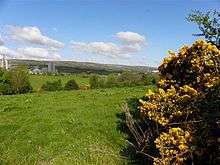Gortineddan

Gortineddan is a townland in the Civil Parish of Tomregan, Barony of Knockninny, County Fermanagh, Northern Ireland.
Etymology
The townland name is an anglicisation of the Gaelic placename “Gort an Fheadáin” which means ‘The Field of the Stream’. The oldest surviving mention of the name is in the Annals of Ulster under the year 1450 AD when Donnchadh Maguire murdered Cathal Maguire, son of Thomas, Chief of the Maguires, at Gort-an-Fhedáin. The same Annals also note a battle at Gort-an-Fhedain in the year 1457 between Chief Thomas Maguire and Lochlann O’Rourke. The townland lies on the border with Cavan and the road south runs through it so it features in a lot of border incidents throughout history. The townland is later mentioned in a grant dated 14 October 1612 where it is spelled ‘Gortmeddan’. Spellings in later grants are 1620- Gortmedan, 1659 – Gortened.[1]
Geography
It is bounded on the north by Ummera townland, on the east by Drumderg and Kiltycrose townlands, on the south by Carickaleese and Knockadoois townlands and on the west by Gortmullan townland and by the international border with County Cavan and the Republic of Ireland. Its chief geographical features are the Duvoge River, Oak Wood and a drumlin hill reaching to 70 metres above sea-level.
The townland is traversed by the Border Road to Ballyconnell and some minor lanes.
Gortineddan covers an area of 255 statute acres.
History
The townland formed part of the ballybethagh of Calvagh in medieval times. At the beginning of the 17th century it was owned jointly by Bryan McPhilip O’Reyly and Edward Rutlidge but was confiscated by the Crown in the 1609 Ulster Plantation and it formed part of the half-territory of Aughrin which was granted to Sir Hugh Culme in 1610. Culme later relinquished his claim to the Crown, perhaps because there was confusion at the time as to whether the townland formed part of County Fermanagh or County Cavan. By an order of the Lord Deputy dated 14 October 1612 the townland was granted, inter alia, to Lady Margaret O’Neill, the widow of Sir Hugh Maguire deceased. In 1641 and also in 1670 it was owned by Sir William Balfour (general).[2]
The Tithe Applotment Books for 1827 list the following tithepayers in the townland- McGee, Bennet, Theackle, Donahy, Elliott, Whittendale, Reilly, McKiernan, Montgomery.[3]
The population of the townland in the 1841 census was 123.
Griffith's Valuation of 1857 lists twenty-three occupiers in the townland.[4]
In the 1901 census of Ireland, there are thirteen families listed in the townland.[5]
In the 1911 census of Ireland, there are fourteen families listed in the townland.[6]
Antiquities
The historic sites in the townland are a medieval ringfort, the international border crossing with the Republic of Ireland and the ruins of Oakhill and Oakwood schoolhouses.
References
- ↑ http://www.placenamesni.org/historicforms.php?getPnameId=13849
- ↑ Settlement on a Plantation Estate, the Balfour Rentals of 1632 and 1636 by John Johnston, in Clogher Record Vol. 12, No. 1 (1985), pp. 92-109
- ↑ Tithe Applotment Books 1827
- ↑ GortineddanGriffith’s Valuation 1857
- ↑ Census of Ireland 1901
- ↑ Census of Ireland 1911